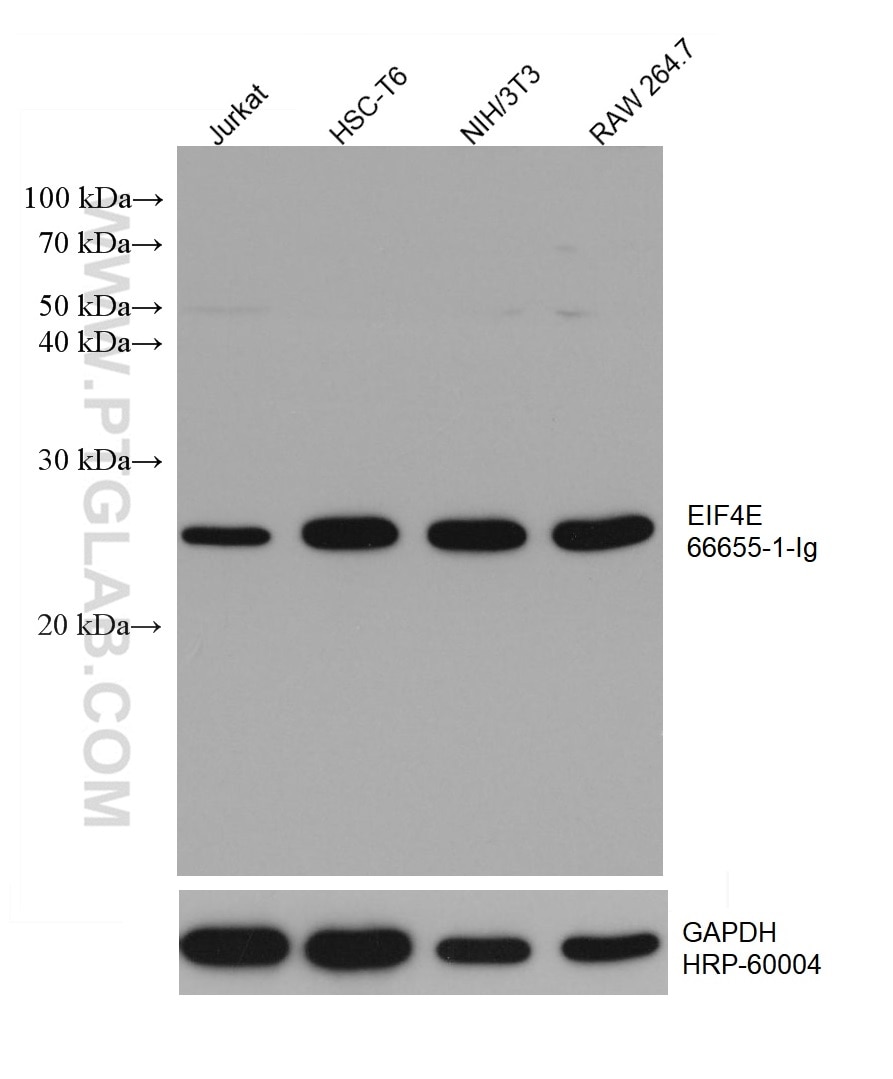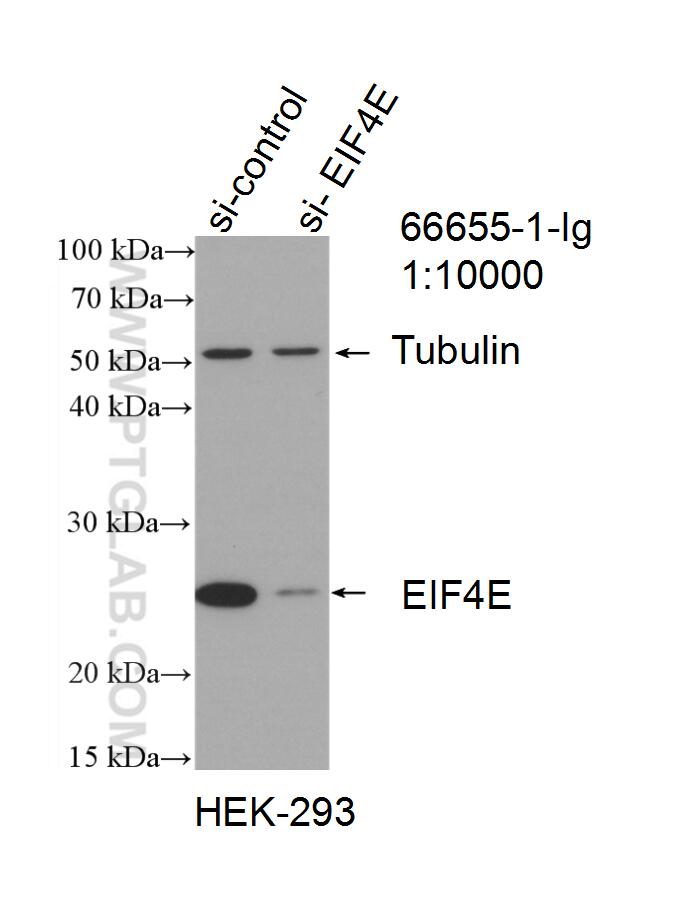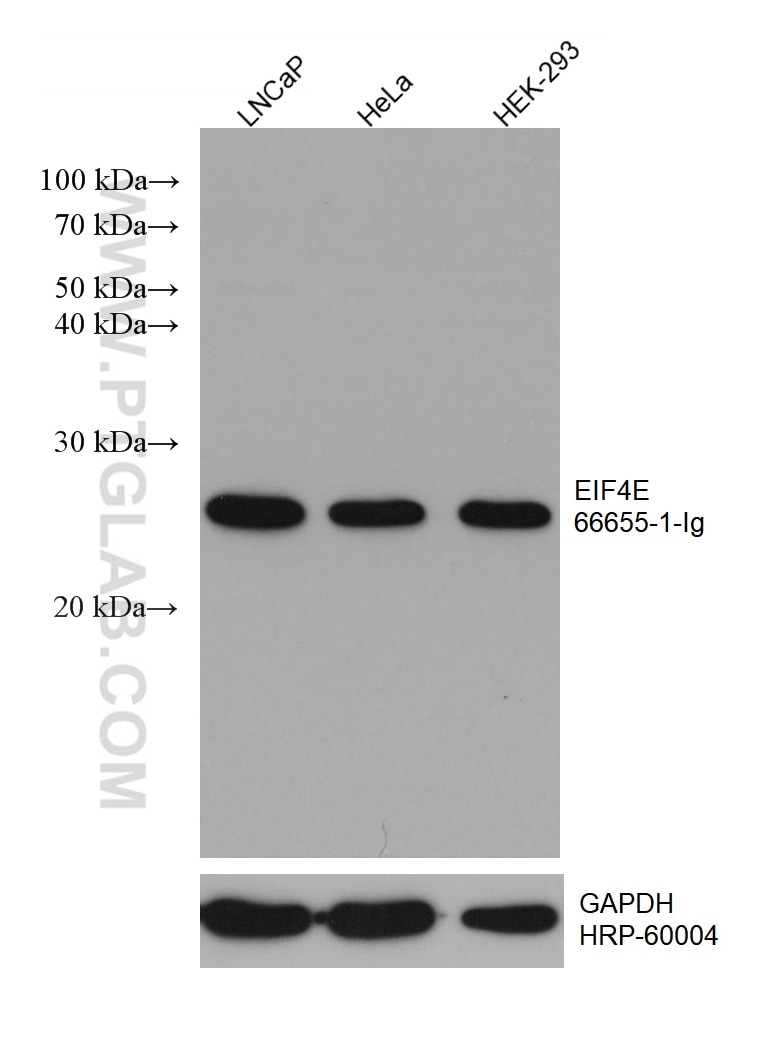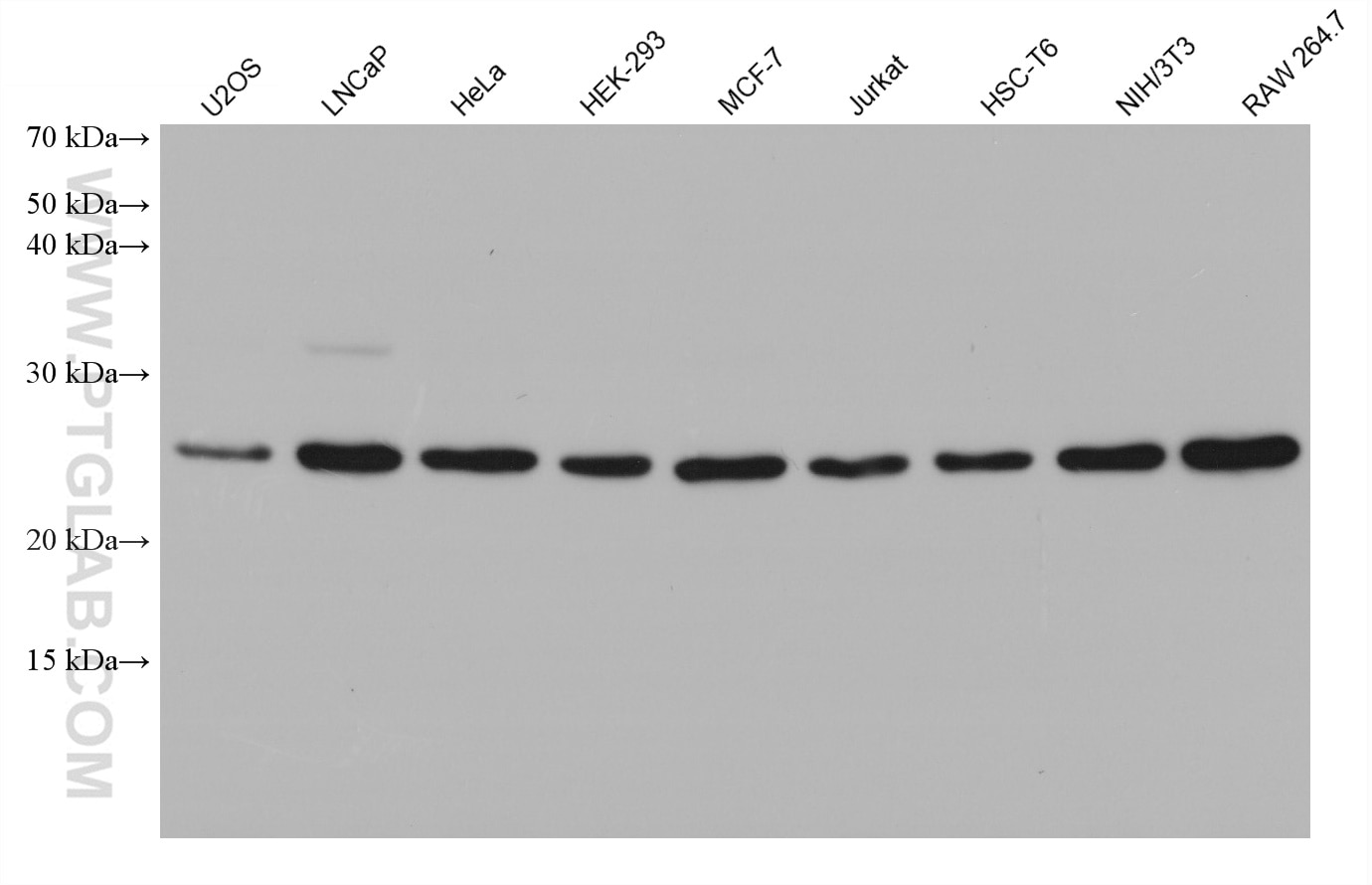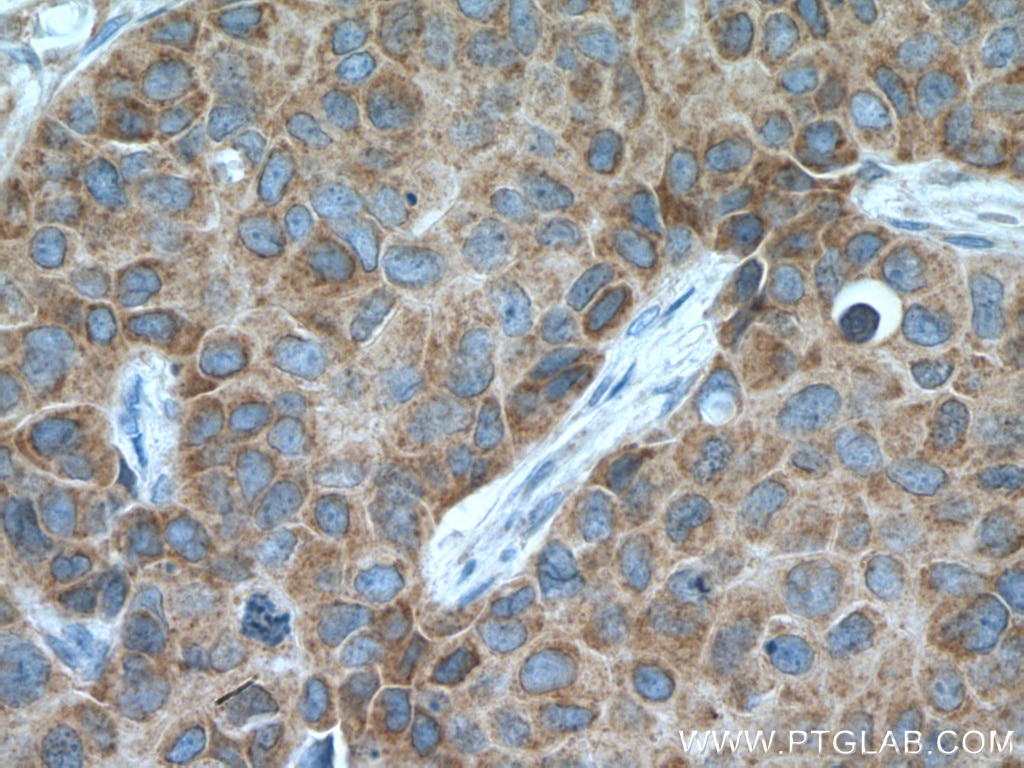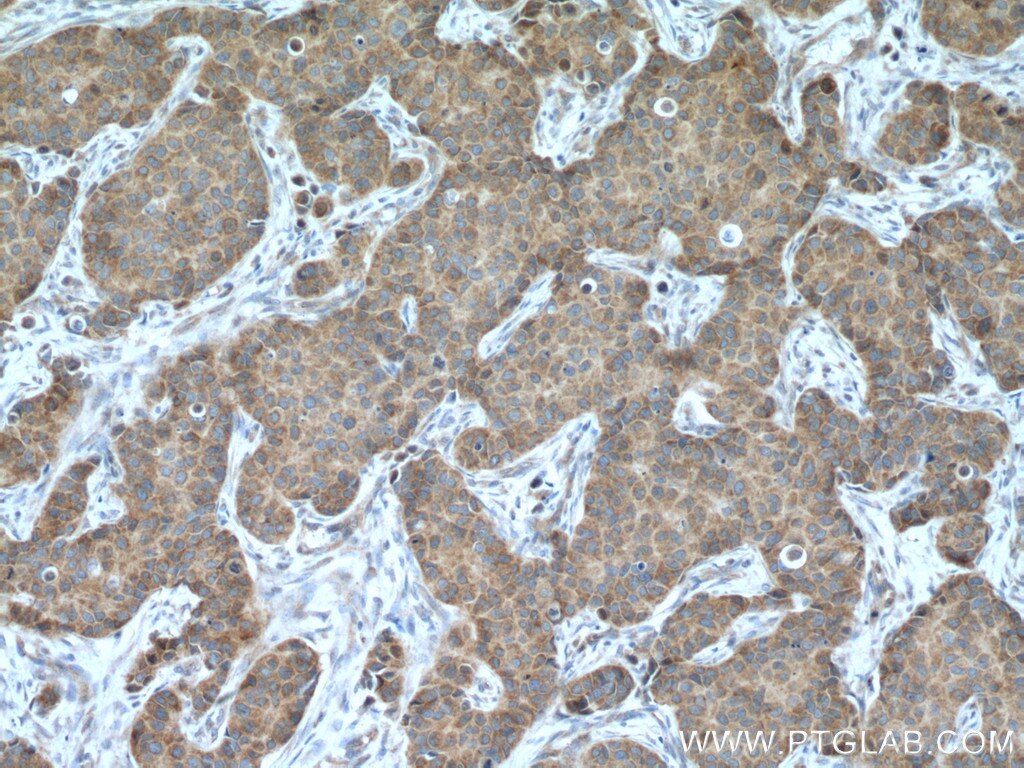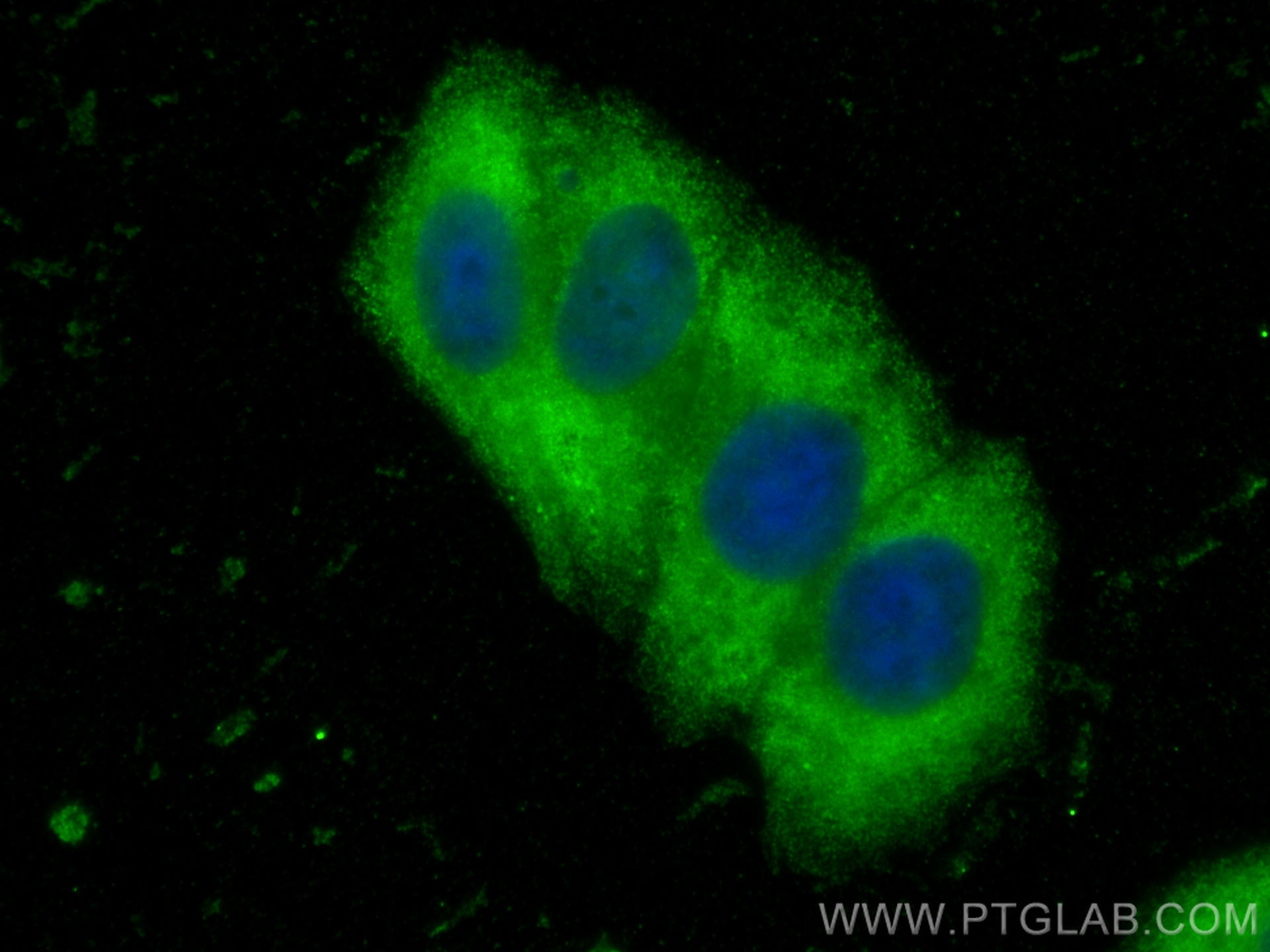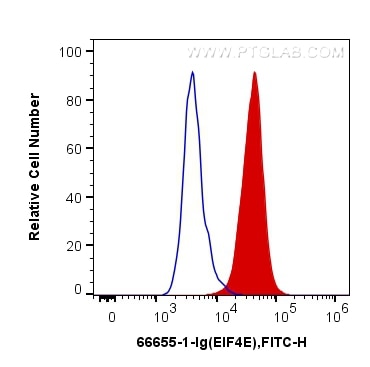- Phare
- Validé par KD/KO
Anticorps Monoclonal anti-EIF4E
EIF4E Monoclonal Antibody for WB, IHC, IF/ICC, FC (Intra), ELISA
Hôte / Isotype
Mouse / IgG1
Réactivité testée
Humain, rat, souris
Applications
WB, IHC, IF/ICC, FC (Intra), ELISA
Conjugaison
Non conjugué
CloneNo.
3C6B9
N° de cat : 66655-1-Ig
Synonymes
Galerie de données de validation
Applications testées
| Résultats positifs en WB | cellules Jurkat, cellules HEK-293, cellules HeLa, cellules HSC-T6, cellules LNCaP, cellules MCF-7, cellules NIH/3T3, cellules RAW 264.7, cellules U2OS |
| Résultats positifs en IHC | tissu de cancer du sein humain, il est suggéré de démasquer l'antigène avec un tampon de TE buffer pH 9.0; (*) À défaut, 'le démasquage de l'antigène peut être 'effectué avec un tampon citrate pH 6,0. |
| Résultats positifs en IF/ICC | cellules HepG2, |
| Résultats positifs en FC (Intra) | cellules HepG2, |
Dilution recommandée
| Application | Dilution |
|---|---|
| Western Blot (WB) | WB : 1:5000-1:50000 |
| Immunohistochimie (IHC) | IHC : 1:2500-1:10000 |
| Immunofluorescence (IF)/ICC | IF/ICC : 1:400-1:1600 |
| Flow Cytometry (FC) (INTRA) | FC (INTRA) : 0.20 ug per 10^6 cells in a 100 µl suspension |
| It is recommended that this reagent should be titrated in each testing system to obtain optimal results. | |
| Sample-dependent, check data in validation data gallery | |
Applications publiées
| KD/KO | See 1 publications below |
| WB | See 5 publications below |
| IHC | See 1 publications below |
| IF | See 1 publications below |
Informations sur le produit
66655-1-Ig cible EIF4E dans les applications de WB, IHC, IF/ICC, FC (Intra), ELISA et montre une réactivité avec des échantillons Humain, rat, souris
| Réactivité | Humain, rat, souris |
| Réactivité citée | Humain, souris |
| Hôte / Isotype | Mouse / IgG1 |
| Clonalité | Monoclonal |
| Type | Anticorps |
| Immunogène | EIF4E Protéine recombinante Ag27191 |
| Nom complet | eukaryotic translation initiation factor 4E |
| Masse moléculaire calculée | 29 kDa |
| Poids moléculaire observé | 26-29 kDa |
| Numéro d’acquisition GenBank | BC012611 |
| Symbole du gène | EIF4E |
| Identification du gène (NCBI) | 1977 |
| Conjugaison | Non conjugué |
| Forme | Liquide |
| Méthode de purification | Purification par protéine G |
| Tampon de stockage | PBS with 0.02% sodium azide and 50% glycerol |
| Conditions de stockage | Stocker à -20°C. Stable pendant un an après l'expédition. L'aliquotage n'est pas nécessaire pour le stockage à -20oC Les 20ul contiennent 0,1% de BSA. |
Informations générales
Eukaryotic translation initiation factor 4E, also known as eIF4E, is a protein that in humans is encoded by the EIF4E gene. eIF4E is the mRNA cap-binding protein, known as a general initiation factor allowing for mRNA-ribosome interaction and cap-dependent translation in eukaryotic cells. eIF4E is a polypeptide that exists as both a free form and as part of the eIF4F pre-initiation complex. Regulation of eIF4E may be achieved via three distinct mechanisms: transcription, phosphorylation, and inhibitory proteins.
Protocole
| Product Specific Protocols | |
|---|---|
| WB protocol for EIF4E antibody 66655-1-Ig | Download protocol |
| IHC protocol for EIF4E antibody 66655-1-Ig | Download protocol |
| IF protocol for EIF4E antibody 66655-1-Ig | Download protocol |
| FC protocol for EIF4E antibody 66655-1-Ig | Download protocol |
| Standard Protocols | |
|---|---|
| Click here to view our Standard Protocols |
Publications
| Species | Application | Title |
|---|---|---|
J Immunother Cancer Genome-scale CRISPR-Cas9 screen reveals novel regulators of B7-H3 in tumor cells. | ||
PNAS Nexus Ribosome stalling during c-myc translation presents actionable cancer cell vulnerability | ||
Neurosci Bull miR-34b-3p Inhibition of eIF4E Causes Post-stroke Depression in Adult Mice.
| ||
Metabolism Anti-sarcopenic effects of active vitamin D through modulation of anabolic and catabolic signaling pathways in human skeletal muscle: A randomized controlled trial | ||
World J Gastroenterol Thymoquinone affects hypoxia-inducible factor-1α expression in pancreatic cancer cells via HSP90 and PI3K/AKT/mTOR pathways |
